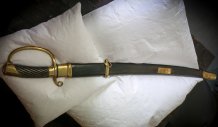
A Cossack sword given to a British soldier - with an inscription using a Russian version of his name - is on show
Stories of Britain’s forgotten role in Russia’s Civil War on display
The forgotten role of British soldiers who died fighting trying to stop the Red Army seizing control of Russia can be seen at a new exhibition.
Troops already exhausted by World War I combat were sent to Northern Russia in 1919 to bolster efforts by White Russians during the country’s civil war. They faced gunfire from Bolsheviks, blistering heat and insects.
A new exhibition shows what happened when soldiers from Devon who had served in the First World War and had expected to return home were instead sent to fight in the forests near the Arctic Circle. As well as the individual stories of soldiers and their letters and hand drawn maps, a Cossack sword given to a British soldier - with an inscription using a Russian version of his name - is on show. The biographies show how soldiers coped with low morale, had their first taste of vodka and displayed award-winning bravery.
Two battalions from British Army were sent to Russia after the First World War to prevent German forces from accessing Russian coastal waters. During engagements with the Red Army troops were killed and taken prisoner before they withdrew in autumn 1919.
The free exhibition, at the Devon and Exeter Institution in Exeter, From Albion to the regions of the North: Russians in Devon, Devonians in Russia, commemorates the centenary of Russia’s October 1917 revolution. It also celebrates the history of the Russian programme at the University of Exeter, the teaching of Russian in Devon schools and Russian elements of the Devon and Exeter Institution’s book collection.
The exhibition is supported by the University of Exeter and includes items loaned by the Keep Military Museum, Dorchester.
One British soldier who died in Russia was 20-year-old subaltern named Norman Hughes, was badly wounded and taken prisoner. Norman, who grew up in Newton Abbot and was an old boy of Newton College, tried to snatch a grenade and throw it at his captors before he died. His fellow officer Lieutenant Colonel Wilcox, wrote in a letter to a fellow officer, that it was “a very gallant act and typical of him…well may they be proud of him.”
Another Devon soldier who died was Lieutenant Tristram J Pine-Coffin, from Bideford. In a letter to his mother from an officer who witnessed his death is on display at the exhibition. Lieutenant Pine-Coffin was killed during an expedition to try to secure a line of retreat. He had only been reunited with his kit the previous evening – he had had to leave England in such a hurry it had to follow him, but had unfortunately been sent to East Africa en route.
The letter reads in part: “His death came as a terrible shock to us all, for somehow we could not imagine any harm befalling him, he had been through many escapes and always came through laughing. He was one of the bravest.”
In a written account on display in the exhibition Lt Col Wilcox describes British troops being “greeted as heroes” by Tsarist officers when they arrived in Archangel.
“Archangel has a peculiar smell which I shall never forget of salted fish and the drying soil after the melting snow,” he said.
Lt Col Wilcox was “nearly driven mad” by mosquitoes, but the weather was good enough to be able to swim in the lake. He complained about having to sleep on the floor of Russian log houses full of cockroaches and other vermin.
Highlights of the Devon and Exeter Institution’s Russian-related books on display will be an 1821 first edition of Specimens of the Russian Poets by Sir John Bowring, the influential Exeter merchant and Radical MP who compiled the first English-language anthology of Russian poetry in translation. Visitors to the exhibition can also see memoirs and travelogues held at the DEI written by other Devon-based men and women who visited Russia in the 19th century, including eyewitness accounts of the Crimean War (1853-6).
The actor and theatre director, Michael Chekhov (1891-1955), nephew of the playwright Anton Chekhov was a visitor to Devon and a photograph of him is in the exhibition. Mr Chekhov led a theatre school of about 20 students between 1936 and 1938 at Dartington Hall, near Totnes.
The exhibition is curated by Dr Muireann Maguire, Lecturer in Russian at the University of Exeter, which has offered courses in Russian language and culture since 1960. There will be free lunchtime lectures from experts about the Russian involvement in the civil war, the history of Russian at the University of Exeter and how Russian was taught in Devon schools.
The exhibition runs at the DEI until December.
Date: 18 October 2017
